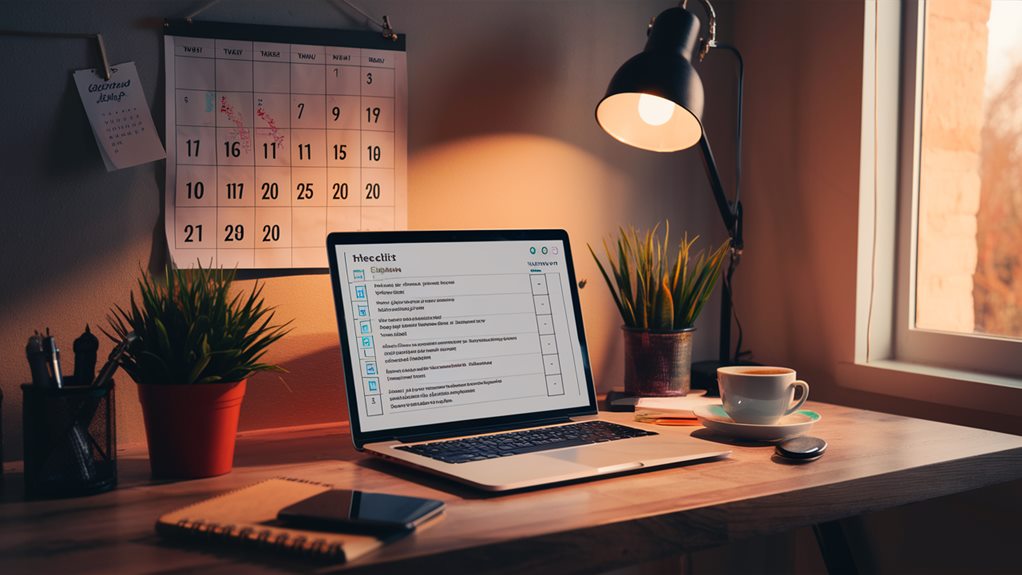To manage deadlines in remote jobs effectively, start by establishing clear priorities using tools like the Eisenhower Matrix. Utilize project management software to streamline collaboration and track progress. Create a structured schedule with dedicated time blocks for focused work, and guarantee your goals are realistic by breaking down tasks. Minimize distractions by designating a workspace and communicating your working hours. Regular breaks boost concentration and creativity. Finally, reflect on your strategies and adjust as needed for continuous improvement. These techniques can enhance your productivity and job satisfaction, leading to a more successful remote working experience.
Key Takeaways
- Establish clear priorities by identifying daily tasks and using the Eisenhower Matrix to focus on what matters most.
- Utilize project management tools to streamline processes, enhance communication, and improve collaboration within your remote team.
- Create a structured schedule by implementing time blocking and designating fixed time slots for high-priority tasks.
- Set realistic goals by breaking down large projects into manageable tasks and aligning them with achievable outcomes.
- Minimize distractions by establishing a dedicated workspace and communicating your working hours to maintain focus.
Establish Clear Priorities

When you're working remotely, establishing clear priorities is essential for staying on track and meeting deadlines. Without a structured approach, it's easy to feel overwhelmed by your responsibilities. To enhance your time management, start by identifying the most pressing tasks each day. This isn't just about what's due soon; it's about understanding which tasks align with your overall goals and the needs of your team. By leveraging resources from exclusive resources, you can gain insights that help you prioritize effectively.
Next, practice task prioritization. Break your workload into manageable chunks and categorize them by urgency and importance. You can use the Eisenhower Matrix, which helps distinguish between what's urgent and what's important, guiding you on where to focus your efforts. By doing this, you'll not only tackle immediate deadlines but also make progress on long-term objectives.
Set aside dedicated time blocks for your highest-priority tasks. This focused approach minimizes distractions and allows you to immerse yourself fully in your work. Additionally, don't hesitate to reassess your priorities regularly.
As projects evolve, so do their demands. Stay flexible and adjust your priorities based on feedback or changes from your team.
Utilize Project Management Tools

To keep your projects on track, utilizing project management tools can make all the difference. These tools help you streamline processes, improve communication, and foster collaboration with your remote team. By implementing effective project management software, you can gain visibility into your project's progress and make sure everyone is aligned with the project's goals.
One of the vital features of these tools is time tracking. You can monitor how much time you and your team spend on various tasks. This insight not only helps you identify potential delays but also empowers you to make informed decisions about resource allocation. Plus, it encourages accountability among team members, fostering a sense of responsibility and belonging.
Another key benefit is the ability to facilitate task delegation. With project management tools, you can assign tasks based on individual strengths and workload. This ensures that everyone knows their responsibilities, reducing confusion and enhancing efficiency. By making it easy to delegate tasks, you create a culture of trust and collaboration, which is essential in a remote work environment.
Furthermore, many project management tools offer features like progress tracking, deadline reminders, and shared calendars, which help keep everyone on the same page. These functionalities not only enhance productivity but also create a sense of unity within your team, reminding everyone that they're working towards a common goal. By incorporating these tools into your workflow, you can effectively manage deadlines and promote a supportive remote work culture.
Create a Structured Schedule

Establishing a structured timetable is crucial for maintaining productivity in remote jobs. A well-organized routine not only helps you stay focused but also assures you meet deadlines without feeling overwhelmed. By creating a structured schedule, you can effectively manage your time and make room for both work and personal activities.
One effective method to implement is time blocking. This technique involves setting specific periods for different tasks, allowing you to concentrate on one thing at a time. Here are three steps to help you create your structured schedule:
- Identify Priorities: List your daily tasks and categorize them based on urgency and importance. Knowing what needs immediate attention can help you allocate your time wisely.
- Allocate Time Blocks: Designate fixed time slots for each task. For instance, you might block off 9 AM to 11 AM for project work and 1 PM to 2 PM for meetings. This way, you minimize distractions and maintain focus.
- Engage Accountability Partners: Share your schedule with a colleague or friend who can help keep you accountable. By regularly checking in with each other, you're more likely to adhere to your plan and stay motivated.
Set Realistic Goals

Creating a structured schedule sets the foundation, but setting realistic goals is what truly drives your productivity in remote jobs. When you align your goals with achievable outcomes, you're not just setting yourself up for success; you're fostering a sense of belonging within your team and organization. Recognizing your limits when goal setting, especially in the flexible environment of remote work, is crucial.
Start by breaking down larger projects into smaller, manageable tasks. This approach enhances your time management skills, allowing you to allocate specific time blocks for each task. It also prevents overwhelm, making it easier to stay focused and motivated.
Remember, quality often trumps quantity; completing a few significant tasks effectively can be more beneficial than hastily finishing numerous less important ones.
Additionally, communicate your goals with your team. Sharing your objectives creates accountability and opens up opportunities for collaboration. It fosters an environment where everyone feels committed to collective success, reinforcing your sense of belonging.
Minimize Distractions

Distractions often creep into your remote work environment, hindering productivity and focus. To effectively manage your time and meet deadlines, it's essential to minimize these distractions. By implementing a few practical strategies, you can enhance your productivity and maintain a sense of belonging within your team.
Here are three effective productivity hacks to keep in mind:
- Designate a Workspace: Establish a specific area in your home exclusively for work. This physical separation helps signal to your brain that it's time to focus, reducing the temptation to engage in off-task activities.
- Set Boundaries: Communicate your working hours to family and friends. Let them know when you're unavailable, which can help minimize interruptions and create a more conducive work environment.
- Use Technology Wisely: Utilize apps that block distracting websites or track your work hours. These tools can greatly enhance your time management skills, allowing you to concentrate on tasks without the allure of social media or other distractions.
Communicate Effectively

Minimizing distractions is only part of the equation when it comes to managing deadlines in remote jobs; effective communication plays an essential role as well. When you're working remotely, staying connected with your team is crucial. This connection not only fosters collaboration but also helps guarantee everyone's on the same page regarding deadlines and project expectations.
One of the key components of effective communication is active listening. It's more than just hearing words; it's about understanding the context and responding thoughtfully. When you engage in conversations, make a conscious effort to listen to your colleagues' ideas and concerns. This practice builds trust and encourages open dialogue, which can ultimately lead to more productive teamwork.
In addition to active listening, providing regular written updates is necessary. These updates keep everyone informed about your progress and any potential roadblocks you might encounter. They create a transparent environment where team members can support each other, offering assistance when needed. Your updates can be brief but should include relevant information to keep your colleagues aligned with your work.
Take Regular Breaks

Taking regular breaks is essential for maintaining productivity and focus in remote jobs. When working from home, it's easy to lose track of time and overlook the importance of stepping away from your screen. Regular breaks not only help with time management but also enhance stress management, allowing you to return to your tasks with renewed energy and clarity.
Here are three key benefits of taking breaks:
- Improved Concentration: Short pauses help reset your brain, enabling you to concentrate better on the tasks at hand. After a break, you're more likely to notice details you might've missed while feeling fatigued.
- Reduced Fatigue: Continuous work can lead to mental exhaustion. By incorporating breaks into your schedule, you allow your mind to recharge, which can prevent burnout and keep you engaged in your work.
- Enhanced Creativity: Stepping away from your work environment can spark new ideas and perspectives. Breaks provide the mental space needed to think outside the box and approach tasks creatively.
Incorporating regular breaks into your daily routine isn't just a luxury; it's a smart time management strategy that fuels productivity. By prioritizing these moments of rest, you're not only managing stress more effectively but also fostering a healthier work-life balance.
Reflect and Adjust Strategies

After incorporating regular breaks into your routine, it's important to reflect on your work strategies and adjust them as needed. Examining your time management techniques can help you identify what's working and what isn't. Take a moment to analyze how you allocate your hours. Are some tasks taking longer than expected? If so, consider breaking them down into smaller, more manageable steps. This not only enhances your workflow but also boosts your confidence as you check off completed tasks.
Another effective strategy is to engage with accountability partners. These are colleagues or friends who share similar goals and deadlines. Regular check-ins with them can provide motivation and support, helping you stay on track. Discuss your challenges and successes; this open dialogue fosters a sense of belonging and creates a community where everyone thrives.
Don't hesitate to tweak your approach based on your reflections. If you notice that certain techniques aren't resonating with your current workload, pivot to something that feels more natural. This adaptability is key in remote work, where flexibility often leads to better productivity.
Lastly, remember that self-reflection is an ongoing process. Set aside time each week to evaluate your progress, celebrate your achievements, and recalibrate your strategies as necessary. By doing so, you not only manage deadlines more effectively but also cultivate a sense of fulfillment and connection in your remote work environment.
Frequently Asked Questions
How Can I Stay Motivated While Working Remotely?
Staying motivated while working remotely can be challenging, but you can boost your productivity by setting boundaries and creating routines. Start by defining your work hours and sticking to them; this helps you separate work from personal time.
Establish a daily routine that includes regular breaks and designated tasks, keeping you focused. Engaging with colleagues through virtual chats can also foster a sense of belonging, making your remote experience more enjoyable and motivating.
What Are the Best Tools for Remote Team Collaboration?
To improve remote team collaboration, it's important to use the right tools. Communication platforms like Slack or Microsoft Teams streamline conversations, while project management tools like Trello or Asana keep everyone organized. Don't overlook file sharing services such as Google Drive, which guarantee everyone has access to necessary documents. Finally, video conferencing tools like Zoom foster real connections. When you combine these tools effectively, your team's productivity and cohesion will flourish.
How Do I Handle Unexpected Changes to Deadlines?
Handling unexpected changes to deadlines can be stressful, but you can tackle it with a flexibility approach. First, reassess your time management and prioritize tasks accordingly. Use effective communication tactics to inform your team about the changes and adjust expectations.
Staying organized helps you adapt quickly, ensuring you meet new deadlines without sacrificing quality. Remember, developing strong prioritization skills will make it easier to navigate these challenges and foster a sense of belonging within your team.
Can I Negotiate Deadlines With My Employer?
Yes, you can negotiate deadlines with your employer. Start by evaluating your workload and identifying areas where flexibility could benefit both you and the team. Use effective time management to prioritize tasks and communicate your needs clearly.
When discussing deadlines, be open to compromise and present your case logically. This flexibility negotiation shows your commitment to quality work while maintaining a healthy work-life balance, fostering a sense of belonging within your team.
What Are Some Tips for Managing Remote Work Stress?
Did you know that 75% of remote workers report feeling stressed? To manage that stress effectively, prioritize self-care practices like regular breaks and exercise. Incorporate mindfulness techniques, such as meditation or deep breathing, to ground yourself during hectic days. Set boundaries between work and personal life to foster a sense of belonging. By nurturing your well-being, you'll enhance your productivity and create a more balanced, fulfilling remote work experience.
Conclusion
In today's fast-paced remote work environment, managing deadlines isn't just about staying busy; it's about working smart. By prioritizing tasks, leveraging tools, and communicating clearly, you can navigate your responsibilities like a seasoned captain steering a ship through stormy seas. Remember to set realistic goals and minimize distractions to keep your focus sharp. Regular reflection and adjustments will guarantee you're always on course, leading to success in your remote job without feeling overwhelmed.
